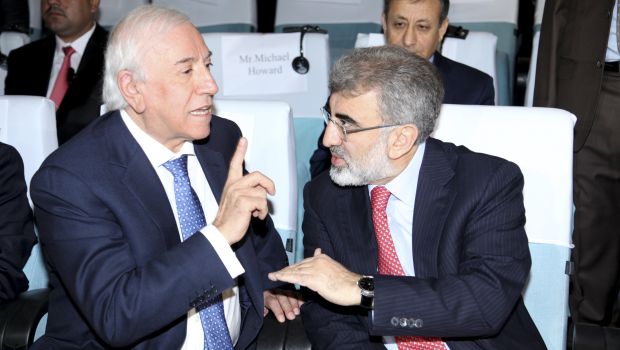
Turkey’s Energy Minister Taner Yıldız (R) speaks with Iraqi Kurdish Regional Government Natural Resources Minister Ashti Hawrami (L) at the Iraq–Kurdistan Oil and Gas Conference at Erbil in Iraq’s Kurdistan region on December 2, 2013. (REUTERS/Azad Lashkari)
Baghdad, Asharq Al-Awsat—The issue of oil exports from the Iraqi Kurdistan region has continued to make the headlines in Iraq following talks between Ankara, Baghdad and Erbil over the last few days about recent oil export agreements between Turkey and Iraqi Kurdistan.
Iraq’s central government in Baghdad and the Kurdistan Regional Government in Erbil have clashed repeatedly over who has the ultimate authority to strike oil export agreements with other states and foreign oil companies.
Erbil and Ankara reached an export agreement at the end of November, angering Baghdad in the latest round of the long-running dispute.
Turkey expressed hope that the remaining issues would be resolved soon. Turkish Energy Minister Taner Yıldız said on Monday that “the Kurdistan region may reach agreement with the central government in Baghdad this month.”
Baghdad announced that it did not object in principle to oil exports from Kurdistan as long as certain conditions were met, but that it rejected the formation of a tripartite committee of Turkey, Iraq and Kurdistan to discuss the issue, preferring a joint Iraqi–Turkish committee with Kurdish representation.
A spokesman for the Iraqi Oil Ministry, Isam Jihad, told Asharq Al-Awsat : “Iraq informed Turkey of its agreement on the export of any quantity of oil from the Kurdistan region, but only according to the regulations agreed by the Federal Oil Ministry and exclusively through SOMO Oil Company [the Iraqi state oil company].”
In response to a question about comments by the Turkish energy minister, Jihad said: “No agreement can be made without considering the main points, which are: first, the consent of the central government; second, the supervision of SOMO; and third, for the quantities to be known through clear meters and for the revenue to go to the Development Fund for Iraq, not a Turkish government fund, because Iraq has international obligations.”
He added: “A proportion of the revenue is deducted for [reparations to] Kuwait and other debtors, and what remains goes to the central bank and then distributed equally according to the constitution.”
On the issue of Kurdish representation in a bilateral Iraqi–Turkish committee suggested by the Iraqi government after rejecting the Turkish proposal of a tripartite committee, Jihad said: “The committee could include technical representatives from the Kurdish side. ”
“The central government will not give way on any of these principles under any circumstances, a fact which Turkey has been informed about.”
Meanwhile, Iraqi Oil Minister Abdul Kareem Al-Luaibi was quoted by Reuters during his visit to Vienna for the OPEC meeting as saying that “tripartite talks would take place in the next few days” to reach agreement about the sharing of oil revenue with the Kurds.
Shawan Mohamed Taha , a member of the Iraqi Parliament’s Kurdistan Bloc, told Asharq Al-Awsat: “The statements we heard recently from executive officials and some members of the State of Law Coalition [led by Prime Minister Nuri Al-Maliki] are nothing but attempts to win votes, even at the expense of the higher national interest of the Iraqi people.”
He said: “What we fear now is the decline in the democratic process, especially when the constitution is constantly interpreted according to what the other side wants, to the extent that they call it ‘central government’ when it is in fact a federal government, because there are no federal regions and governorates without centralized administration.”
Taha added that “The government persists in not passing the oil and gas bill in order to keep interpreting the constitution as it wishes, not to mention the fact that it uses double standards in its application of the law, where everything related to the economy uses the laws from the previous regime, while in political issues it uses its own laws which revolve around exclusion.”
On the Turkish minister’s comments about an agreement being reached this month between Erbil and Baghdad, Taha said: “The Turkish minister knows the constitution very well, and much better than most Iraqi MPs. I would also like to point out that they were accusing us of hindering the export of oil and causing huge losses to the budget, and here they are, the same parties [reference to Deputy Prime Minister for Energy Hussein Al-Shahristani and State of Law members] standing against the export of oil and the payment of the dues to international oil companies.”
